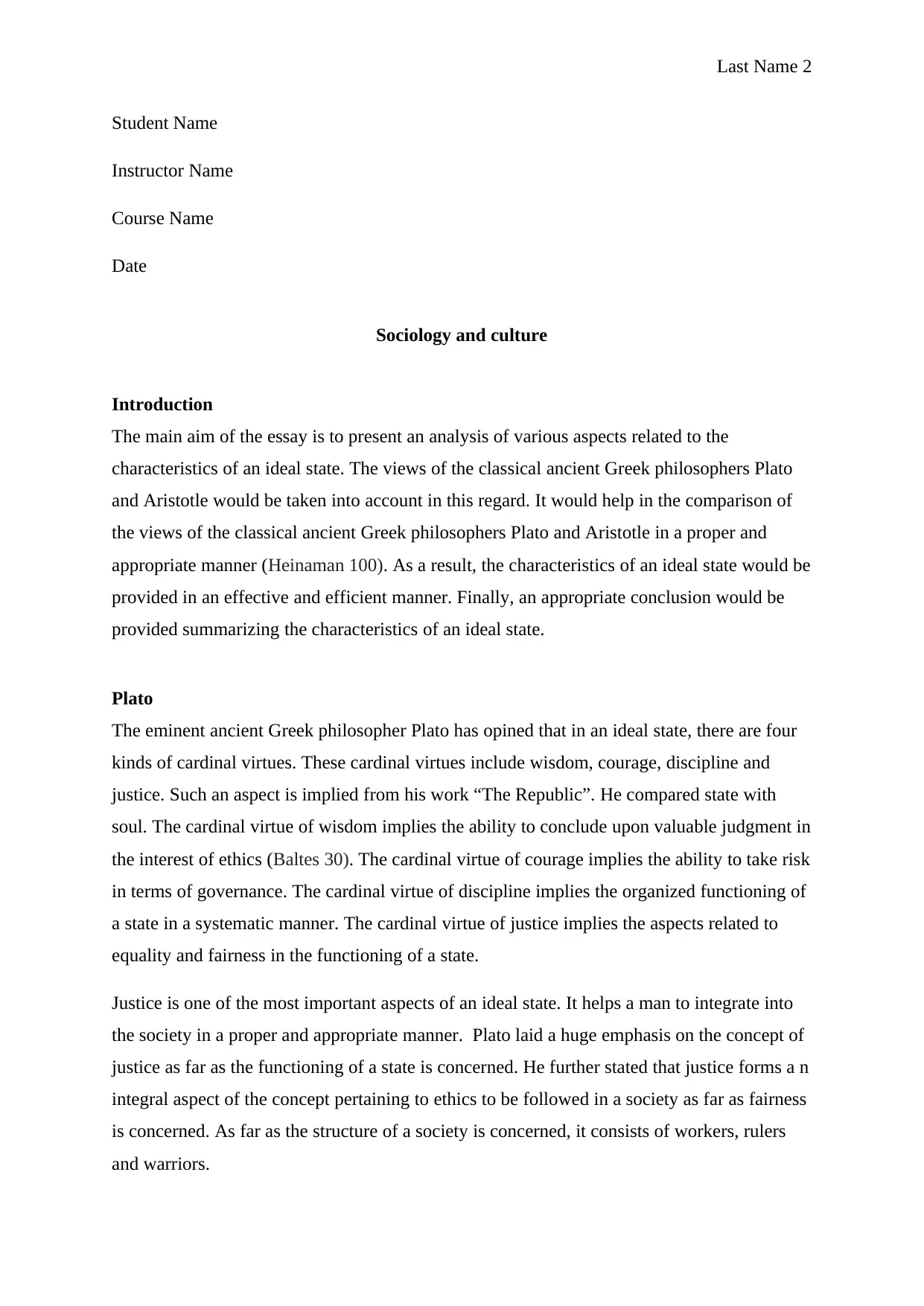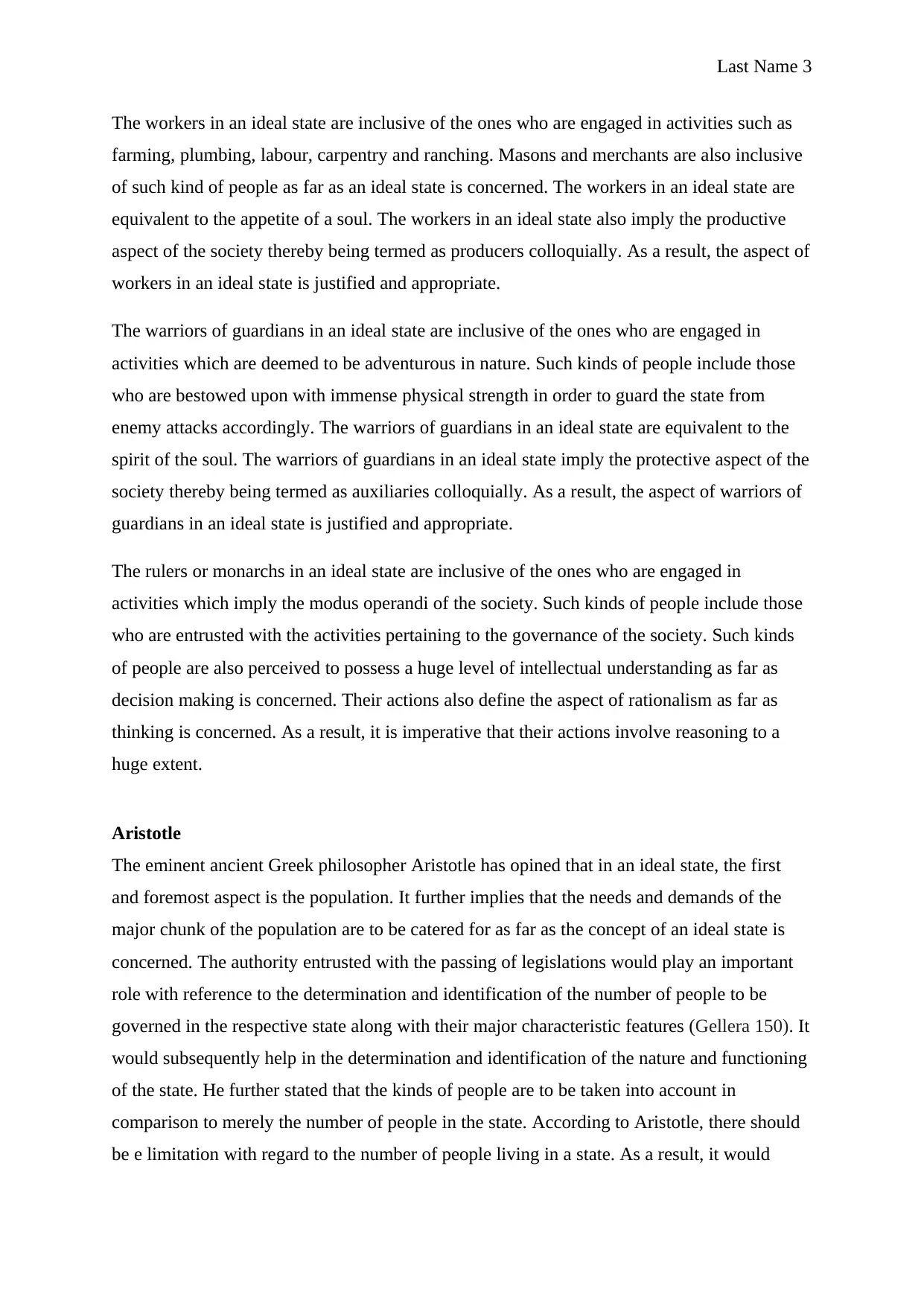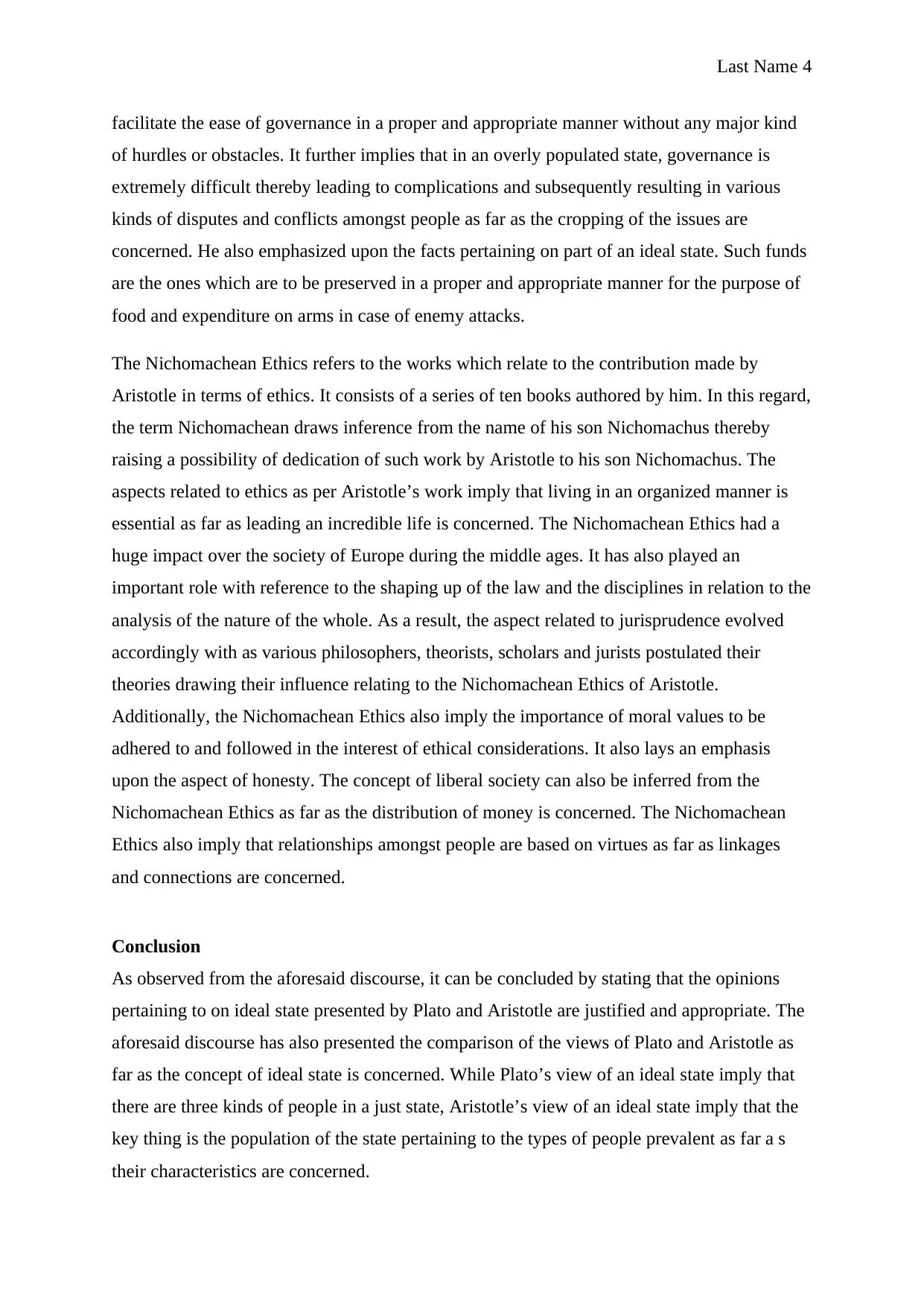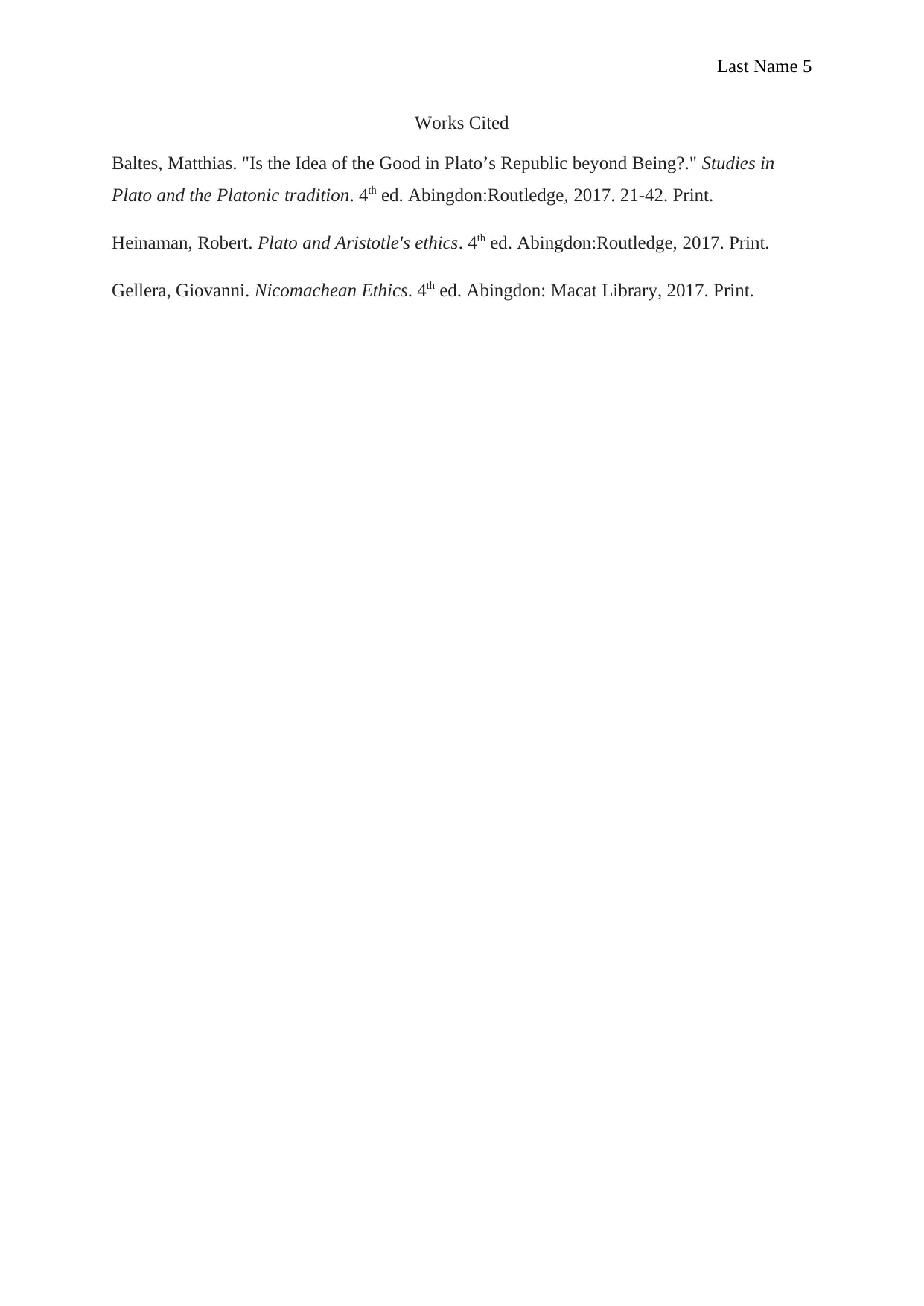A Comparative Analysis of Plato and Aristotle's Ideal State Concepts
VerifiedAdded on 2023/04/20
|5
|1412
|286
Essay
AI Summary
This essay presents a comparative analysis of Plato and Aristotle's perspectives on the characteristics of an ideal state. It delves into Plato's concept of cardinal virtues—wisdom, courage, discipline, and justice—and his division of society into workers, warriors, and rulers. The essay then explores Aristotle's emphasis on population size and the importance of catering to the needs of the governed, as well as the significance of ethical considerations as outlined in his Nichomachean Ethics. The study concludes by highlighting the key differences between Plato's focus on societal structure and Aristotle's emphasis on population and ethical governance, while affirming the enduring relevance of both philosophers' contributions to understanding the ideal state.

Last Name 1
Sociology and culture
Sociology and culture
Paraphrase This Document
Need a fresh take? Get an instant paraphrase of this document with our AI Paraphraser

Last Name 2
Student Name
Instructor Name
Course Name
Date
Sociology and culture
Introduction
The main aim of the essay is to present an analysis of various aspects related to the
characteristics of an ideal state. The views of the classical ancient Greek philosophers Plato
and Aristotle would be taken into account in this regard. It would help in the comparison of
the views of the classical ancient Greek philosophers Plato and Aristotle in a proper and
appropriate manner (Heinaman 100). As a result, the characteristics of an ideal state would be
provided in an effective and efficient manner. Finally, an appropriate conclusion would be
provided summarizing the characteristics of an ideal state.
Plato
The eminent ancient Greek philosopher Plato has opined that in an ideal state, there are four
kinds of cardinal virtues. These cardinal virtues include wisdom, courage, discipline and
justice. Such an aspect is implied from his work “The Republic”. He compared state with
soul. The cardinal virtue of wisdom implies the ability to conclude upon valuable judgment in
the interest of ethics (Baltes 30). The cardinal virtue of courage implies the ability to take risk
in terms of governance. The cardinal virtue of discipline implies the organized functioning of
a state in a systematic manner. The cardinal virtue of justice implies the aspects related to
equality and fairness in the functioning of a state.
Justice is one of the most important aspects of an ideal state. It helps a man to integrate into
the society in a proper and appropriate manner. Plato laid a huge emphasis on the concept of
justice as far as the functioning of a state is concerned. He further stated that justice forms a n
integral aspect of the concept pertaining to ethics to be followed in a society as far as fairness
is concerned. As far as the structure of a society is concerned, it consists of workers, rulers
and warriors.
Student Name
Instructor Name
Course Name
Date
Sociology and culture
Introduction
The main aim of the essay is to present an analysis of various aspects related to the
characteristics of an ideal state. The views of the classical ancient Greek philosophers Plato
and Aristotle would be taken into account in this regard. It would help in the comparison of
the views of the classical ancient Greek philosophers Plato and Aristotle in a proper and
appropriate manner (Heinaman 100). As a result, the characteristics of an ideal state would be
provided in an effective and efficient manner. Finally, an appropriate conclusion would be
provided summarizing the characteristics of an ideal state.
Plato
The eminent ancient Greek philosopher Plato has opined that in an ideal state, there are four
kinds of cardinal virtues. These cardinal virtues include wisdom, courage, discipline and
justice. Such an aspect is implied from his work “The Republic”. He compared state with
soul. The cardinal virtue of wisdom implies the ability to conclude upon valuable judgment in
the interest of ethics (Baltes 30). The cardinal virtue of courage implies the ability to take risk
in terms of governance. The cardinal virtue of discipline implies the organized functioning of
a state in a systematic manner. The cardinal virtue of justice implies the aspects related to
equality and fairness in the functioning of a state.
Justice is one of the most important aspects of an ideal state. It helps a man to integrate into
the society in a proper and appropriate manner. Plato laid a huge emphasis on the concept of
justice as far as the functioning of a state is concerned. He further stated that justice forms a n
integral aspect of the concept pertaining to ethics to be followed in a society as far as fairness
is concerned. As far as the structure of a society is concerned, it consists of workers, rulers
and warriors.

Last Name 3
The workers in an ideal state are inclusive of the ones who are engaged in activities such as
farming, plumbing, labour, carpentry and ranching. Masons and merchants are also inclusive
of such kind of people as far as an ideal state is concerned. The workers in an ideal state are
equivalent to the appetite of a soul. The workers in an ideal state also imply the productive
aspect of the society thereby being termed as producers colloquially. As a result, the aspect of
workers in an ideal state is justified and appropriate.
The warriors of guardians in an ideal state are inclusive of the ones who are engaged in
activities which are deemed to be adventurous in nature. Such kinds of people include those
who are bestowed upon with immense physical strength in order to guard the state from
enemy attacks accordingly. The warriors of guardians in an ideal state are equivalent to the
spirit of the soul. The warriors of guardians in an ideal state imply the protective aspect of the
society thereby being termed as auxiliaries colloquially. As a result, the aspect of warriors of
guardians in an ideal state is justified and appropriate.
The rulers or monarchs in an ideal state are inclusive of the ones who are engaged in
activities which imply the modus operandi of the society. Such kinds of people include those
who are entrusted with the activities pertaining to the governance of the society. Such kinds
of people are also perceived to possess a huge level of intellectual understanding as far as
decision making is concerned. Their actions also define the aspect of rationalism as far as
thinking is concerned. As a result, it is imperative that their actions involve reasoning to a
huge extent.
Aristotle
The eminent ancient Greek philosopher Aristotle has opined that in an ideal state, the first
and foremost aspect is the population. It further implies that the needs and demands of the
major chunk of the population are to be catered for as far as the concept of an ideal state is
concerned. The authority entrusted with the passing of legislations would play an important
role with reference to the determination and identification of the number of people to be
governed in the respective state along with their major characteristic features (Gellera 150). It
would subsequently help in the determination and identification of the nature and functioning
of the state. He further stated that the kinds of people are to be taken into account in
comparison to merely the number of people in the state. According to Aristotle, there should
be e limitation with regard to the number of people living in a state. As a result, it would
The workers in an ideal state are inclusive of the ones who are engaged in activities such as
farming, plumbing, labour, carpentry and ranching. Masons and merchants are also inclusive
of such kind of people as far as an ideal state is concerned. The workers in an ideal state are
equivalent to the appetite of a soul. The workers in an ideal state also imply the productive
aspect of the society thereby being termed as producers colloquially. As a result, the aspect of
workers in an ideal state is justified and appropriate.
The warriors of guardians in an ideal state are inclusive of the ones who are engaged in
activities which are deemed to be adventurous in nature. Such kinds of people include those
who are bestowed upon with immense physical strength in order to guard the state from
enemy attacks accordingly. The warriors of guardians in an ideal state are equivalent to the
spirit of the soul. The warriors of guardians in an ideal state imply the protective aspect of the
society thereby being termed as auxiliaries colloquially. As a result, the aspect of warriors of
guardians in an ideal state is justified and appropriate.
The rulers or monarchs in an ideal state are inclusive of the ones who are engaged in
activities which imply the modus operandi of the society. Such kinds of people include those
who are entrusted with the activities pertaining to the governance of the society. Such kinds
of people are also perceived to possess a huge level of intellectual understanding as far as
decision making is concerned. Their actions also define the aspect of rationalism as far as
thinking is concerned. As a result, it is imperative that their actions involve reasoning to a
huge extent.
Aristotle
The eminent ancient Greek philosopher Aristotle has opined that in an ideal state, the first
and foremost aspect is the population. It further implies that the needs and demands of the
major chunk of the population are to be catered for as far as the concept of an ideal state is
concerned. The authority entrusted with the passing of legislations would play an important
role with reference to the determination and identification of the number of people to be
governed in the respective state along with their major characteristic features (Gellera 150). It
would subsequently help in the determination and identification of the nature and functioning
of the state. He further stated that the kinds of people are to be taken into account in
comparison to merely the number of people in the state. According to Aristotle, there should
be e limitation with regard to the number of people living in a state. As a result, it would
⊘ This is a preview!⊘
Do you want full access?
Subscribe today to unlock all pages.

Trusted by 1+ million students worldwide

Last Name 4
facilitate the ease of governance in a proper and appropriate manner without any major kind
of hurdles or obstacles. It further implies that in an overly populated state, governance is
extremely difficult thereby leading to complications and subsequently resulting in various
kinds of disputes and conflicts amongst people as far as the cropping of the issues are
concerned. He also emphasized upon the facts pertaining on part of an ideal state. Such funds
are the ones which are to be preserved in a proper and appropriate manner for the purpose of
food and expenditure on arms in case of enemy attacks.
The Nichomachean Ethics refers to the works which relate to the contribution made by
Aristotle in terms of ethics. It consists of a series of ten books authored by him. In this regard,
the term Nichomachean draws inference from the name of his son Nichomachus thereby
raising a possibility of dedication of such work by Aristotle to his son Nichomachus. The
aspects related to ethics as per Aristotle’s work imply that living in an organized manner is
essential as far as leading an incredible life is concerned. The Nichomachean Ethics had a
huge impact over the society of Europe during the middle ages. It has also played an
important role with reference to the shaping up of the law and the disciplines in relation to the
analysis of the nature of the whole. As a result, the aspect related to jurisprudence evolved
accordingly with as various philosophers, theorists, scholars and jurists postulated their
theories drawing their influence relating to the Nichomachean Ethics of Aristotle.
Additionally, the Nichomachean Ethics also imply the importance of moral values to be
adhered to and followed in the interest of ethical considerations. It also lays an emphasis
upon the aspect of honesty. The concept of liberal society can also be inferred from the
Nichomachean Ethics as far as the distribution of money is concerned. The Nichomachean
Ethics also imply that relationships amongst people are based on virtues as far as linkages
and connections are concerned.
Conclusion
As observed from the aforesaid discourse, it can be concluded by stating that the opinions
pertaining to on ideal state presented by Plato and Aristotle are justified and appropriate. The
aforesaid discourse has also presented the comparison of the views of Plato and Aristotle as
far as the concept of ideal state is concerned. While Plato’s view of an ideal state imply that
there are three kinds of people in a just state, Aristotle’s view of an ideal state imply that the
key thing is the population of the state pertaining to the types of people prevalent as far a s
their characteristics are concerned.
facilitate the ease of governance in a proper and appropriate manner without any major kind
of hurdles or obstacles. It further implies that in an overly populated state, governance is
extremely difficult thereby leading to complications and subsequently resulting in various
kinds of disputes and conflicts amongst people as far as the cropping of the issues are
concerned. He also emphasized upon the facts pertaining on part of an ideal state. Such funds
are the ones which are to be preserved in a proper and appropriate manner for the purpose of
food and expenditure on arms in case of enemy attacks.
The Nichomachean Ethics refers to the works which relate to the contribution made by
Aristotle in terms of ethics. It consists of a series of ten books authored by him. In this regard,
the term Nichomachean draws inference from the name of his son Nichomachus thereby
raising a possibility of dedication of such work by Aristotle to his son Nichomachus. The
aspects related to ethics as per Aristotle’s work imply that living in an organized manner is
essential as far as leading an incredible life is concerned. The Nichomachean Ethics had a
huge impact over the society of Europe during the middle ages. It has also played an
important role with reference to the shaping up of the law and the disciplines in relation to the
analysis of the nature of the whole. As a result, the aspect related to jurisprudence evolved
accordingly with as various philosophers, theorists, scholars and jurists postulated their
theories drawing their influence relating to the Nichomachean Ethics of Aristotle.
Additionally, the Nichomachean Ethics also imply the importance of moral values to be
adhered to and followed in the interest of ethical considerations. It also lays an emphasis
upon the aspect of honesty. The concept of liberal society can also be inferred from the
Nichomachean Ethics as far as the distribution of money is concerned. The Nichomachean
Ethics also imply that relationships amongst people are based on virtues as far as linkages
and connections are concerned.
Conclusion
As observed from the aforesaid discourse, it can be concluded by stating that the opinions
pertaining to on ideal state presented by Plato and Aristotle are justified and appropriate. The
aforesaid discourse has also presented the comparison of the views of Plato and Aristotle as
far as the concept of ideal state is concerned. While Plato’s view of an ideal state imply that
there are three kinds of people in a just state, Aristotle’s view of an ideal state imply that the
key thing is the population of the state pertaining to the types of people prevalent as far a s
their characteristics are concerned.
Paraphrase This Document
Need a fresh take? Get an instant paraphrase of this document with our AI Paraphraser

Last Name 5
Works Cited
Baltes, Matthias. "Is the Idea of the Good in Plato’s Republic beyond Being?." Studies in
Plato and the Platonic tradition. 4th ed. Abingdon:Routledge, 2017. 21-42. Print.
Heinaman, Robert. Plato and Aristotle's ethics. 4th ed. Abingdon:Routledge, 2017. Print.
Gellera, Giovanni. Nicomachean Ethics. 4th ed. Abingdon: Macat Library, 2017. Print.
Works Cited
Baltes, Matthias. "Is the Idea of the Good in Plato’s Republic beyond Being?." Studies in
Plato and the Platonic tradition. 4th ed. Abingdon:Routledge, 2017. 21-42. Print.
Heinaman, Robert. Plato and Aristotle's ethics. 4th ed. Abingdon:Routledge, 2017. Print.
Gellera, Giovanni. Nicomachean Ethics. 4th ed. Abingdon: Macat Library, 2017. Print.
1 out of 5
Your All-in-One AI-Powered Toolkit for Academic Success.
+13062052269
info@desklib.com
Available 24*7 on WhatsApp / Email
![[object Object]](/_next/static/media/star-bottom.7253800d.svg)
Unlock your academic potential
Copyright © 2020–2026 A2Z Services. All Rights Reserved. Developed and managed by ZUCOL.

